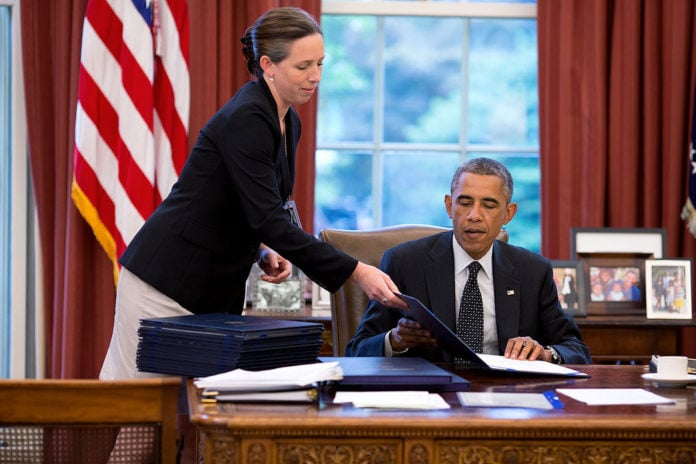In a case involving the return to the United States of a deported illegal alien, U.S. District Judge Arthur J. Schwab for the Western District of Pennsylvania has ruled that President Barack Obama exceeded his authority when he issued a presidential memorandum on November 20 granting de facto amnesty for an estimated 5 million people living in the U.S. illegally.
His ruling systematically dismantled President Obama’s argument that he had waited long enough for Congress to act . . . that his action would no longer be necessary if Congress would pass legislation to his liking… and that he was exercising his power of “prosecutorial discretion” to deal with the nation‘s illegal alien crisis.
In his ruling, Judge Schwab wrote:
“President Obama’s unilateral legislative action violates the separation of powers provided for in the United States Constitution as well as the Take Care Clause, and therefore, is unconstitutional”.
“Obama contended that although legislation is the most appropriate course of action to solve the immigration debate, his executive action was necessary because of Congress’s failure to pass legislation, acceptable to him, in this regard.”
The judge added that:
“This proposition is arbitrary and does not negate the requirement that the November 20, 2014, executive action be lawfully within the president’s executive authority.” “It is not.”
Judge Schwab, appointed to his post by President George W. Bush in 2002, defended his opinion by citing precedent writing that the:
“ . . . framework of our Constitution, the president’s power to see that the laws are faithfully executed refutes the idea that he is to be a lawmaker.” “The Constitution limits his functions in the lawmaking process to the recommending of laws he thinks wise and the vetoing of laws he thinks bad”.
At the time President Obama signed his “executive memorandum”, the president said that he had waited long enough for the Congress to act on immigration reform and that he thought it was time for him to act – a contention that Judge Schwab wrote was largely irrelevant.
As part of his argument, Judge Schwab posed this hypothetical.
“Would it be permissible for a president, who was dissatisfied with a high tax rate on long term capital gains (as limiting economic growth), to instruct the IRS to only collect taxes at a rate of 15 percent rather than the legislative prescribed 20 percent rate, or defer prosecution of any taxpayer who pays at least 15 percent but not the full 20 percent, unless Congress ‘pass a bill’ lowering the rate within a specified time period? Both this IRS scenario and the executive action at issue in this case violate the separation of powers.”
Commenting on President Obama’s claim that his orders would no longer will be necessary if Congress passed a bill meeting his standards, the judge added that:
“…presidential action may not serve as a stopgap or a bargaining chip to be used against the legislative branch.” “While ‘the power of executing the laws necessarily includes both authority and responsibility to resolve some questions left open by Congress that arise during the law’s administration,’ it does not include unilateral implementation of legislative policies…”
Finally, as to the president’s belief that he was acting within his “prosecutorial discretion” power as Chief Executive, Judge Schwab wrote that:
“The executive action” . . . is “class-based” and that “such formulaic application of criteria, especially given the wide breadth of the program, in essence, substantively changes the statutory removal system ‘rather than simply adapting its application to individual circumstances.”
The case involved the return to the U.S. of the illegal alien, Elionardo Juarez-Escobar, a defendant who pleaded guilty to the felony of re-entry of a removed alien.
The judge ordered that the defendant file a motion and brief seeking to withdraw his guilty plea by January 6, 2015 . . . continue to sentencing on January 22 to time served and pursue his rights, if any, under Obama’s order or be delivered by the Marshal Service to the U.S. Immigration and Customs Enforcement (ICE) for deposition.





























